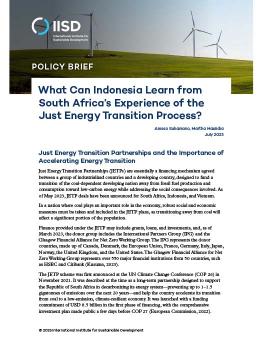
What Can Indonesia Learn from South Africa's Experience of the Just Energy Transition Process?
Indonesia is currently in the process of preparing its comprehensive investment plan as part of the Just Energy Transition Partnership (JETP). This brief assesses the JETP process South Africa went through one year after it was announced to highlight any relevant findings and lessons to assist policy-makers implementing the Indonesian JETP.
Just Energy Transition Partnerships (JETPs) are a financing mechanism agreed between a group of industrialized countries and a developing country.
The second JETP deal was announced during the G20 Summit in November 2022. The IPG—led by the United States and Japan—pledged to mobilize USD 20 billion (around IDR 300 trillion) over the next 3–5 years to accelerate Indonesia’s energy transition through early retirement of coal power plants and deployment of renewable energy. The deal appears to herald a dramatic shift in energy policy, setting a new target for renewables—which will need to account for 34% of the country’s power production by 2030.
Having reviewed the experience of South Africa's JETP this brief recommends that Indonesia:
- Select Projects to Be Included in the JETP IP Carefully and Be Able to Demonstrate Results
- Agree on a Strong Energy Policy That Binds the Power Sector in Indonesia to the Coal Phase-Out Plan as Laid Out in the JETP IP
- Focus Clearly on the Social Impacts of JETP
- Seize the Opportunity of the JETP IP and Use Public Funds to Leverage Private Investment
- Mitigate Risk and Ensure Smooth Implementation of the JETP by Prioritizing the Achievement of a Broad Consensus Across Government
- Translate the Commitment to JETP Into Legislation
Participating experts
You might also be interested in
The Cost of Fossil Fuel Reliance
Government support for fossil fuels reached at least USD 1.5 trillion in 2023, new data shows.
February 2025 | Carbon Minefields Oil and Gas Exploration Monitor
In January 2025, 77 oil and gas exploration licences were awarded in seven different countries, with Norway leading in terms of embodied emissions.
State of the Sector: Critical energy transition minerals for India
This report presents a comprehensive strategy for securing a reliable supply of critical energy transition materials (CETMs) essential to India's clean energy and low-carbon technology initiatives.
Indonesian Electric Vehicle Boom: A temporary trend or a long-term vision?
Indonesia is pursuing policies to accelerate the adoption of electric vehicles (EVs) and build a thriving domestic industry. However, to maximize long-term benefits, the government must ensure foreign manufacturers do more than just sell cars—they need to invest in local jobs, supply chains, and technology transfer.